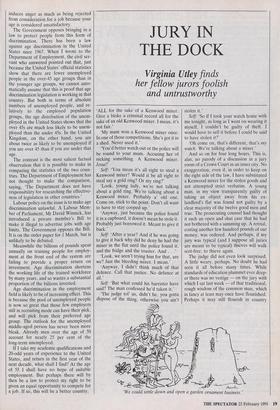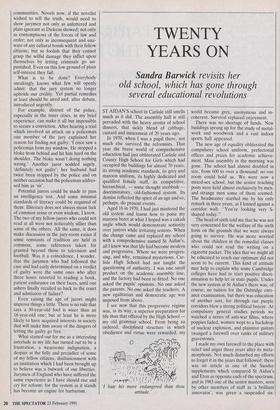JURY IN THE DOCK
Virginia Utley finds
her fellow jurors foolish and untrustworthy
'ALL for the sake of a Kenwood mixer. Give a bloke a criminal record all for the sake of an old Kenwood mixer. I mean, it's not fair.'
'My mum won a Kenwood mixer once. In one of those competitions. She's got it in a shed. Never used it.' 'You'd better watch out or the police will be round to your mum. Accusing her of nicking something. A Kenwood mixer. Jesus!' Self: 'You mean it's all right to steal a Kenwood mixer? Would it be all right to steal say a gold ring? Or my ring?' 'Look, young lady, we're not talking about a gold ring. We're talking about a Kenwood mixer. Probably a' old one. Come on, stick to the point. Don't all want to have to stay cooped up.' 'Anyway, just because the police found it in a cupboard, it doesn't mean he stole it. Probably just borrowed it. Meant to give it back.'
Self: 'After a year? And if he was going to give it back why did he deny he had the mixer in the flat until the police found it, and the fridge and the toaster. And . . 'Look, we aren't trying him for that, are we? Just the bleeding mixer. I mean.'
'Anyway, I didn't think much of that defence. Call that justice. No defence at all.'
Self: 'But what could his barrister have said? The man confessed he'd taken it.'
'The judge tol' us, didn't he, you gotta dispose of the thing, otherwise you ain't
stolen it.'
Self: 'So if I took your watch home with me tonight, as long as I went on wearing it myself, I couldn't be guilty of theft. I would have to sell it before I could be said to have stolen it?'
'Oh come on, that's different, that's my watch. We're talking about a mixer.'
And so on for four long hours. This is, alas, no parody of a discussion in a jury room of a Crown Court in an inner city. No exaggeration, even if, in order to keep on the right side of the law, I have substituted a Kenwood mixer for the stolen goods and not attempted strict verbatim. A young man, in my view transparently guilty of taking an object away from his ex- landlord's flat was found not guilty by a clear majority of the twelve good men and true. The prosecuting counsel had thought it such an open and shut case that he had not bothered with a summing up. A retrial, costing another few hundred pounds of our money, was ordered. And perhaps, if my jury was typical (and I suppose all juries are meant to be typical) thieves will walk scot-free, to thieve again. The judge did not even look surprised. A little weary, perhaps. No doubt he had seen it all before many times. While standards of education plummet ever deep- er there was no vestige — on the jury with which I sat last week — of that traditional, rough wisdom of the common man, which in fancy at least may once have flourished. Perhaps it may still flourish in country
'We could settle down and open a garden ornament business.' communities. Novels now, if the novelist wished to tell the truth, would need to show jurymen not only as unlettered and plain ignorant as Dickens showed; not only as contemptuous of the forces of law and order; not only as inconsequent and una- ware of any cultural bonds with their fellow citizens; but so foolish that they cannot grasp the wilful damage they inflict upon themselves by letting criminals go un- punished. Even on this low ground of plain self-interest they fail.
What is to be done? Everybody sneakingly knows what few will openly admit: that the jury system no longer upholds our civility. Yet partial remedies at least should be aired and, after debate, introduced urgently.
For example, distrust of the police, especially in the inner cities, in my brief experience, can make it all but impossible to secure a conviction. After hearing a trial which involved an attack on a policeman one member of the jury explained her reason for finding not guilty: 'I once saw a policeman from my window. He stopped a bloke from behind and hit him hard on the shoulder. The bloke wasn't doing nothing wrong.' Another juror nodded sagely, 'definitely not guilty'; her husband had twice been stopped by the police and on neither occasion had the policeman addres- sed him as 'sir'.
Potential jurors could be made to pass an intelligence test. And some minimal standards of literacy could be required of them. Illiteracy does not always mean lack of common sense or even wisdom, I know. The two of my fellow-jurors who could not read at all were not noticeably sillier than some of the others. All the same, it does make discussion in the jury-room easier if some remnants of tradition are held in common, some references taken for granted beyond those to television and football. Was it a coincidence, I wonder, that the jurymen who had followed the case and had early determined on a verdict of guilty were the same ones who after three hours resorted to reading a book, patient endurance on their faces, until our ushers finally recalled us back to the court and admission of failure?
Even raising the age of jurors might improve things a little. There is no rule that says a 30-year-old fool is wiser than an 18-year-old one; but at least he is more likely to have acquired interests in society that will make him aware of the dangers of letting the guilty go free.
What started out for me as a interesting interlude in my life has turned out to be a frustration, a wearisome indignation, a despair at the folly and prejudice of some of my fellow citizens, disillusionment with an institution which I had been brought up to believe was a bulwark of our liberties. Jurymen of England who have suffered the same experience as I have should rise and cry for reform; for the system as it stands has become an engine for barbarism.



















































 Previous page
Previous page